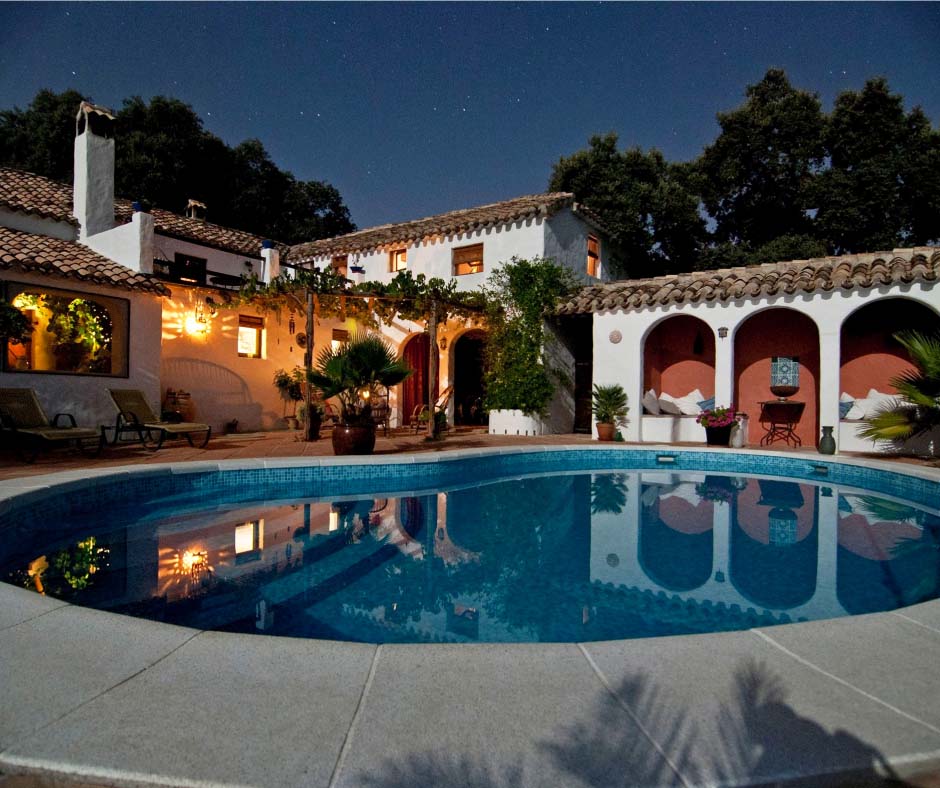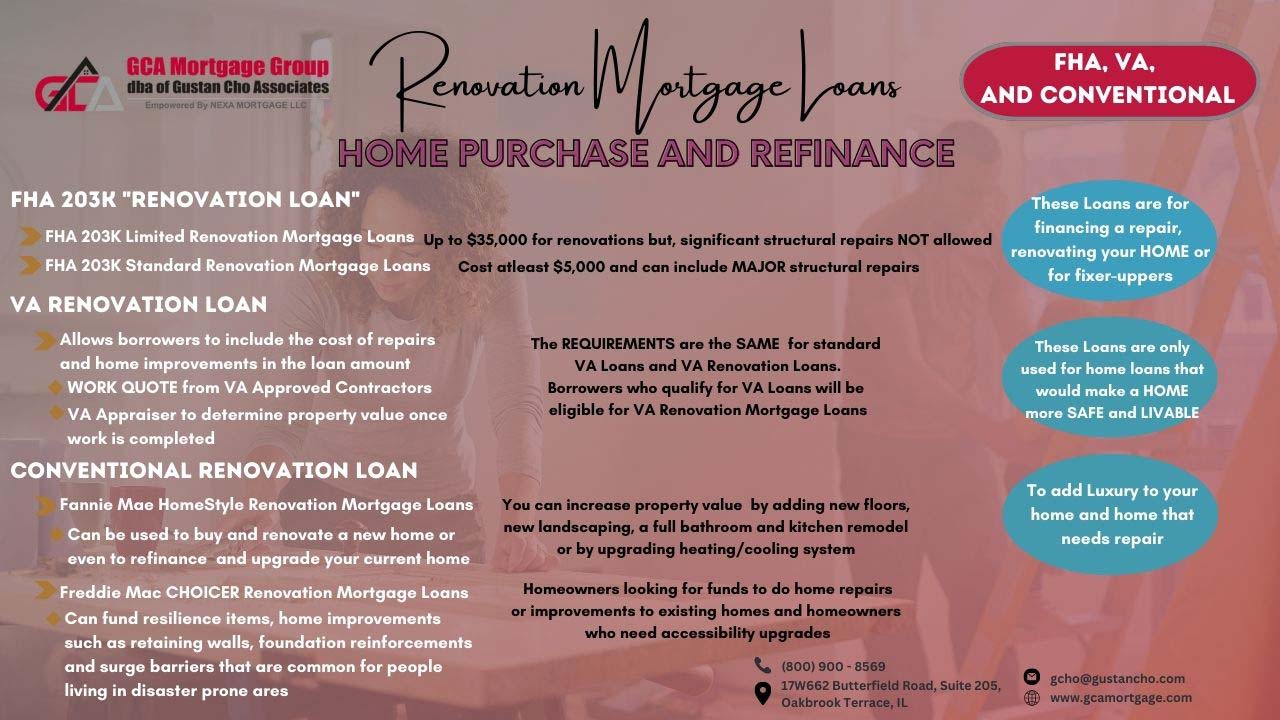Renovation Mortgage Loans For Home Purchase and Refinance
In this blog, we will cover and discuss Renovation Mortgage Loans for purchase and refinance transactions. Today we will be covering FHA, VA, and Conventional Renovation Mortgage Loans.
What Are Renovation Mortgage Loans?
In this section of this guide to renovation mortgage loans, we will be discussing what are renovation mortgage loans and how the renovation mortgage loans process work.
What are Renovation Mortgage Loans? It is just a home loan that borrowers take out to fix up their homes. It could be for an outdated kitchen or bathroom overhaul. Homeowners often want to boost their home value or are just plain tired of looking at an old home. A homeowner might not have all the cash they need to complete renovations but have the ability to pay back over time.
Learn more about Renovation Mortgage Loans with us. Click here!
FHA Renovation Mortgage Loans
An FHA Renovation Loan is also known as an FHA 203K loan. The FHA is the Federal Housing Authority. The FHA insures lenders for giving these loans, which provides them with added insurance for lending to individuals who might not otherwise get funded. These loans are for financing a repair, renovating your home, or for fixer-uppers.
You can use this loan for buying a home that needs repairs as long as it’s for a primary residence. The FHA requires only a 3.5% downpayment and follows the usual FHA guidelines, although there may be lender overlays. This loan type can be used for additions as well. The total loan amount is based on 110$ of the “after completed” value.
How does FHA 203k Renovation Mortgage Loans Work?
There are two types of FHA Renovation Mortgage Loans.
- The FHA 203K Limited Renovation Mortgage Loans
- The FHA 203K Standard Renovation Mortgage Loans
The FHA 203k limited renovation mortgage loans can provide up to $35,000 for renovations, but significant structural repairs are not allowed. The 203k standard renovation mortgage loans if for renovations that cost at least $5,000 and can include major structural repairs.
If you choose this option, you must hire a HUD consultant to oversee the entire process. Included in these repairs can be the following: accessibility for a disabled individual, aspects of significant landscaping overhauls, fixing problematic sewer and plumbing systems, roof repair, and making a home more energy efficient. These loans cannot be used for investment properties. Additionally, you will need FHA mortgage insurance if you borrow on an FHA Renovation Loan.
How To Qualify For FHA 203k Renovation Mortgage Loans
You will need to have a credit score of 500 or better unless the lender has an overlay requiring a higher credit score. The down payment amount is 3.5%, but it depends on your credit score. Most lenders will want a credit score of 580 or higher for this benefit. If your credit score is in the range of 500-579, you will need to put down 10%.
The max loan amount varies for where you live, but if you are buying a home with this loan, the FHA loan amount cap is $420,680, and $970,800 in higher-cost areas. You will also want to keep in mind that a foreclosure within the last three years might make qualifying more difficult.
Prequalified in just 5 minutes!
VA Renovation Mortgage Loans
The VA, Veterans Association allows borrowers to include the cost of repairs and home improvements in the loan amount. This helps buyers as the loan amount includes the cost of repairs, and the payments are all rolled into one. This loan is similar to a regular VA Loan. It allows borrowers no down payment, no mortgage insurance, and low-interest rates; however, getting a VA renovation loan is more challenging than a regular loan.
How Do VA Renovation Mortgage Loans Work?
A borrower will need to get work quotes from VA-approved contractors. A VA appraiser will also need to determine the property’s value once the work is completed. These loans are backed by the VA, which allows lenders to feel more comfortable working with borrowers who might not otherwise qualify.
Who is Eligible for VA Renovation Mortgage Loans?
The requirements are the same for standard VA loans and VA Renovation Mortgage Loans. The borrower will need a Certificate of Eligibility, COE. Borrowers who qualify for VA loans will be eligible for VA Renovation Mortgage Loans.
For individuals who are currently serving in the military or veterans who were honorably discharged, more than six years of National Guard or reservist service. The service must include 90 consecutive days of active service during a war or at least 181 consecutive days of active service during peace. Or be a surviving spouse of a service member killed in the line of active duty. You will need to live in the home as your primary residence. The VA does not have minimum credit requirements, which are set by the lenders. Typically, the required VA renovation loan requirements are 620 from lenders.
How do VA Renovation Mortgage Loans Work?
You must live in the property as your primary residence, and you can’t use a VA renovation loan to flip properties or have investment income. These loans are only used for home loans that would make a home more safe and livable, not luxury improvements. You won’t be able to fund a jacuzzi install or install granite throughout the house. Instead, these VA renovations are used to make the home more accessible to the disabled, fix or replace old appliances, update a poor heating or cooling system, or fix impassible or unsafe walkways. A VA Renovation loan can’t be used for significant structural changes to a home, such as foundation repair.
How Long Do You Have To Complete Renovation?
Additionally, the repairs must be completed within 120 days after closing- which can be tight due to contractors’ schedules. Although it depends on your lender, the VA renovation loan limit is typical $50,000. If you add the home’s sale price, the cost of renovations vs. the estimated value of your house once renovations are done, you can borrow the lesser of the two. A VA appraiser has to determine the property value as completed. You will also need a VA-approved contractor to complete the repair.
Conventional Renovation Mortgage Loans
These loans must follow the requirements of Fannie Mae and Freddie Mac. Because they have more strict guidelines, you can use these loans to add luxury to your home, such as swimming pools, outdoor kitchens, etc. If a homeowner wants to buy a home that needs repairs, this type of loan is also available to you. Many borrowers can see a house with good “bones” and buy at a great cost and update it to fit their desires. This allows for the cost of purchasing a home and the renovations to be consolidated into one payment. This will enable you to borrow based on future value after the renovations are completed.
How Do Conventional Renovation Mortgage Loans Work?
With a conventional renovation loan, you will need detailed cost estimates and plans to give to an appraiser. The appraiser will issue an as improved value. There are two main types of conventional renovation loan programs. These are Fannie Mae’s Homestyle renovation loan and Freddie MAC’s CHOICE Renovation.
Fannie Mae Homestyle Renovation Mortgage Loans
These loans can be used to buy and renovate a new home or even to refinance and upgrade your current home. Borrowers of the Fannie Mae Homestyle loan can be used it for a townhome, condo, one-unit second home, one-unit investment home, and single-family detached home. Additionally, these loans can be used for a duplex, triplex, or quadruplex. You can increase property value by adding new floors, new landscaping, a full bathroom, and kitchen remodel or updating your heating and cooling systems.
You will need a minimum of 3% down, a minimum credit score of 620, and an acceptable debt-to-income ratio. These can vary by lender. If you are buying a second home, the debt-to-loan ratio is 10%, investment property is 15%, a duplex is 15%, and a triplex or quadplex is 25%
Freddie Mac CHOICER Renovation Mortgage Loans
This is very similar to Fannie Mae’s renovation loan, with 3-5% down, credit of 620 or higher, and debt to income ratio the lender finds acceptable. These loans are great for first-time homebuyers who want to fix a home, homeowners looking for funds to do home repairs or improvements to existing homes, and homeowners who need accessibility upgrades. It can be used for 1-4 unit primary residences, 1 unit investment properties, 1 unit second homes, condos, and manufactured homes.
A big difference from the Fannie Mae Homestyle Renovation loan is that with the CHOICE Renovation loan, you can fund resilience items. These are home improvements such as retaining walls, foundation reinforcements, and surge barriers that are common for people who live in disaster-prone areas.
Fannie Mae and Freddie Mac Private Mortgage Insurance Guidelines
Both Freddie Mac and Fannie Mae renovation mortgage loans allow you to drop Private Mortgage Insurance once you have 20% equity in your home. This will be significant savings for the homeowner throughout the long term! Regardless of what loan type best meets your needs, you have options out there. Work with a mortgage lender who can assist you in finding the best loan option for your plans.
Frequently Asked Questions (FAQs)
- What is a renovation mortgage loan?
A renovation mortgage loan is a type of financing that allows homeowners to borrow funds to purchase a home that needs renovation or refinance an existing mortgage to include funds for renovations. - How does a renovation mortgage loan differ from a traditional mortgage?
Unlike traditional mortgages that only cover the purchase price or refinance amount, renovation mortgage loans provide additional funds specifically designated for renovation or repair costs. - What types of renovation projects can be financed with a renovation mortgage loan?
Renovation mortgage loans can typically finance many projects, including kitchen and bathroom remodels, structural repairs, room additions, roofing, flooring, and HVAC upgrades. - Can I use a renovation mortgage loan for a fixer-upper property?
Yes, renovation mortgage loans are often used for purchasing fixer-upper properties. These loans allow buyers to finance the purchase price and renovation costs in a single loan, simplifying the process. - What are the benefits of using a renovation mortgage loan?
The primary benefits include the ability to finance renovation costs into the mortgage, potentially increasing the property’s value, and avoiding the need for separate financing or cash reserves for renovations. - How do lenders determine the loan amount for a renovation mortgage?
Lenders generally determine the loan amount on the property’s projected value after renovations, often referred to as the “after-repair value” (ARV). They may also consider the cost of renovations and the borrower’s qualifications. - Are there different types of renovation mortgage loans available?
There are various renovation mortgage loans, including FHA 203(k) loans, Fannie Mae HomeStyle loans, VA renovation loans, and conventional renovation loans. Each has its eligibility requirements and features. - Can I use a renovation mortgage loan for energy-efficient upgrades?
Numerous renovation mortgage loan programs provide financing choices for energy-efficient enhancements, such as installing solar panels, enhancing insulation, or upgrading windows and doors to energy-efficient alternatives. - Can I refinance my existing mortgage with a renovation mortgage loan?
Certainly, it’s feasible to refinance a current mortgage with a renovation mortgage loan, often referred to as a renovation refinance. This allows homeowners to borrow additional funds for renovations while refinancing their mortgage. - Should I apply for a renovation mortgage loan with a specialized lender or renovation consultant?
While it’s not always necessary, working with a lender experienced in renovation mortgage loans or consulting with a renovation specialist can provide valuable guidance and assistance throughout the process, helping ensure a smooth and successful renovation project.
Start your renovation mortgage loan journey with Gustan Cho Associates. Talk to our expert loan officers by calling us at 800-900-8569 or text us for a faster response. You can also email us at alex@gustancho.com. We are available even during weekends and holidays!








